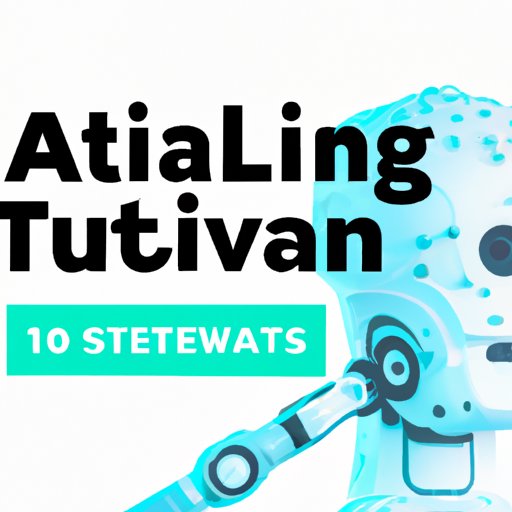Introduction
Artificial intelligence (AI) is a rapidly developing field of technology that has the potential to revolutionize many aspects of our lives. AI tools are at the forefront of this revolution. In this article, we will explore what AI tools are, their various benefits and applications, a comprehensive guide to AI tools, and the future potential of these tools for businesses.
Definition of AI Tools
AI tools are computer-based systems that use artificial intelligence to automate tasks, such as data analysis, natural language processing, image recognition, and more. AI tools use algorithms to interpret data and make decisions, allowing them to perform complex tasks with accuracy and speed. AI tools can be used in a variety of industries, from healthcare to finance, to improve efficiency and accuracy.
Benefits and Applications of AI Tools
AI tools offer many advantages over traditional methods of data analysis and decision making. For example, AI tools can process large amounts of data quickly and accurately, freeing up time for other tasks. AI tools can also identify patterns and trends in data that may not be immediately apparent to humans. Additionally, AI tools can make decisions faster than humans, allowing businesses to stay ahead of the competition. Finally, AI tools can help reduce the costs associated with manual data analysis, freeing up resources for other areas of the business.

A Comprehensive Guide to AI Tools
AI tools come in a variety of shapes and sizes. The most common types of AI tools are machine learning algorithms, natural language processing (NLP), image recognition, and robotic process automation (RPA). Each type of AI tool has its own unique set of benefits and applications. Let’s explore each type of AI tool in more detail.
Types of AI Tools
Machine learning algorithms are used to train computers to recognize patterns in data. This type of AI tool can be used to identify trends in large datasets, predict customer behaviors, and optimize processes. NLP is used to understand and interpret human language, allowing computers to “understand” text and respond accordingly. Image recognition AI tools can be used to quickly analyze large amounts of images, such as medical scans or satellite imagery. Finally, RPA is used to automate mundane, repetitive tasks, such as data entry or customer service.
Exploring the Benefits and Applications
AI tools can be used in a variety of industries to automate tasks and improve accuracy and efficiency. In healthcare, AI tools can be used to diagnose diseases, monitor patients, and detect anomalies in medical scans. In finance, AI tools can be used to analyze stock markets, identify investment opportunities, and optimize trading strategies. AI tools can also be used in retail, manufacturing, and a variety of other industries to automate mundane tasks and improve customer service.
A Beginner’s Guide to AI Tools
If you’re new to AI tools, there are a few things you should know before getting started. First, AI tools require a certain level of expertise to set up and use. You’ll need to have a basic understanding of programming and data analysis in order to get the most out of your AI tools. Second, AI tools require access to large amounts of data in order to function properly. This means you’ll need to have a reliable source of data in order to make the most of your AI tools.
What They Are
AI tools are computer-based systems that use artificial intelligence to automate tasks. These tools use algorithms to interpret data and make decisions, allowing them to perform complex tasks with accuracy and speed. AI tools can be used in a variety of industries to automate mundane tasks, identify patterns and trends in data, and make decisions faster than humans.
How to Use AI Tools
Using AI tools requires a certain level of expertise. You’ll need to have a basic understanding of programming and data analysis in order to get the most out of your AI tools. Additionally, AI tools require access to large amounts of data in order to function properly. Once you have the necessary expertise and data, you’ll be able to set up and use your AI tools to automate tasks, identify patterns and trends, and make decisions faster than humans.

AI Tools: The Future of Automation
AI tools are transforming the way businesses operate. By automating mundane tasks, identifying patterns and trends in data, and making decisions faster than humans, AI tools are becoming increasingly powerful and versatile. As AI tools become more advanced, they will have an even greater impact on businesses.
Overview of Their Power and Potential
AI tools are becoming increasingly powerful and versatile. They can be used to automate mundane tasks, identify patterns and trends in data, and make decisions faster than humans. As AI tools become more advanced, they will have an even greater impact on businesses. For example, AI tools can be used to optimize processes, reduce costs, and improve customer service.
Benefits for Businesses
AI tools offer numerous benefits for businesses. By automating mundane tasks, AI tools can free up time for employees to focus on higher value tasks, such as strategic planning and innovation. AI tools can also be used to identify patterns and trends in data, allowing businesses to stay ahead of the competition. Finally, AI tools can help reduce costs associated with manual data analysis, freeing up resources for other areas of the business.
Conclusion
AI tools are computer-based systems that use artificial intelligence to automate tasks. These tools offer numerous benefits, such as reducing costs, improving accuracy and efficiency, and identifying patterns and trends in data. AI tools are becoming increasingly powerful and versatile, and they have the potential to revolutionize the way businesses operate. With the right expertise and data, businesses can take advantage of the power and potential of AI tools to improve their operations.
(Note: Is this article not meeting your expectations? Do you have knowledge or insights to share? Unlock new opportunities and expand your reach by joining our authors team. Click Registration to join us and share your expertise with our readers.)
